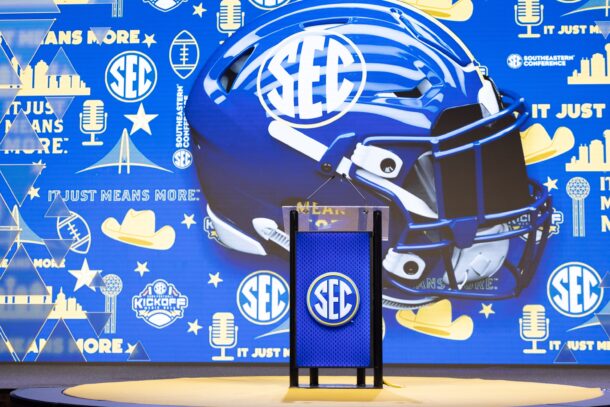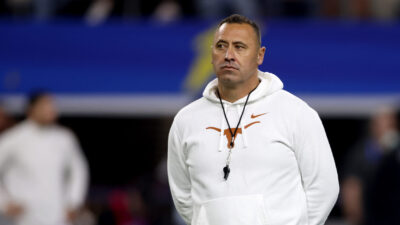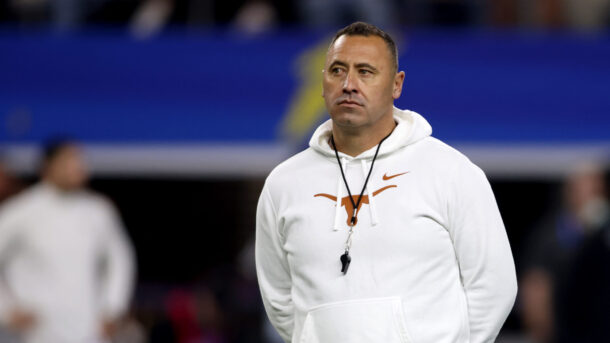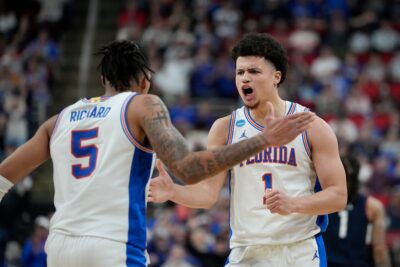Ad Disclosure

Georgia’s offensive performance in its 24-10 loss to Florida wasn’t just bad, it was historically bad.
The Bulldogs’ 21 rushing yards were the team’s fewest since 1996, when they ran for 16 yards against Kentucky. Even worse, Georgia’s 164 total yards were the lowest since it gained 131 yards against Clemson in 1990.
With proven commodities like Nick Chubb and Sony Michel highlighting a talented and deep backfield, such a low total is a big surprise. It also helps identify the main problem with Georgia’s rushing attack and, to a greater extent, the offense as a whole.
Throughout Saturday’s rivalry game against Florida, it became apparent that Georgia’s offense line was not able to win at the line of scrimmage, something that has been a common theme for much of the season.
After the loss, Kirby Smart deflected any insinuation that the Bulldogs’ line is the source of their offensive problems.
“We don’t look for blame,” Smart said at his Monday press conference. “It’s a team game, and Sony (Michel) and Nick Chubb are as good a team players as anywhere in this country. Those two kids love that offensive line, they appreciate what they do for them and we don’t point blame. Nobody points blame.”
With three new players joining seniors Brandon Kublanow, Greg Pyke and Isaiah Wynn in the offensive line rotation, there were some expected early struggles. Against Ole Miss, Tennessee and South Carolina, however, it appeared as though the Bulldogs were finally starting to find a rhythm up front.
After failing to crack 100 yards on the ground in back-to-back weeks and averaging a lowly 1.6 yards per carry against Vanderbilt and Florida, that momentum is long gone.
Under Mark Richt, Georgia sought to become smaller and more mobile on the offensive line. As such, the Bulldogs entered this season with one of the smallest units up front in the SEC.
Upon taking over as the Bulldogs’ head coach, Smart made it a point to say that they needed to get better along the line on both sides of the ball. Offensive coordinator Jim Chaney has shown an affinity for running the ball between the tackles, but that’s difficult to achieve with this unit.
“I don’t deal with hypotheticals, I’ve told you that before,” Smart said Monday when asked how long it would take to get his ideal offensive line in place. “I think it’s a situation where we’ve got to improve. We’ve got to get the guys we have here to play better. I’m not looking for pointing the finger or the blame at them, it’s our responsibility as coaches and offensive staff and offensive line coach to get the ball to the playmakers and allow them to make plays.”
Therein lies that main problem for Georgia. Entering this season, many believed the Bulldogs would rely on one of the SEC’s best running backs to lead yet another vaunted rushing attack and give true freshman quarterback Jacob Eason time to get comfortable. Despite his best efforts, though, Chubb (below) can only do so much.

Against Florida, Georgia’s running backs were constantly met in the backfield and fought hard just to avoid a loss. Chubb’s longest run was 7 yards. Chubb averaged more than 7 yards per carry in the entirety of the 2014 and 2015 seasons.
Smart mentioned finding ways to get the ball into the hands of the Bulldogs’ playmakers, but the team’s best player only carried the ball nine times against the Gators. Moving forward, Chubb has to get more touches, but it’s hard to lay the blame completely on Smart and Chaney after seeing how ineffective the offensive line was.
“When you’ve got some good backs you’ve got to get those backs enough touches,” Smart said Monday. “But there’s a fine line between being stubborn with the run and not being able to run the ball, and how long you stick with it versus taking shots (in the passing game).
“We’ve got to get those backs the ball more. We know that, they know that, it’s being addressed. But saying that, when you’re not successful running it, you can’t keep banging your head against the wall.”
Interestingly and somewhat counter to Smart’s head-banging assessment, Georgia gained 4 or more yards on five first-down runs against Florida, seemingly enough to stay ahead of the chains.
Still, the Dawgs find themselves in the frustrating position of being a run-oriented team that can’t run the ball. Its best players are neutralized by the inability to consistently open lanes at the line of scrimmage.
When that happens, Eason is forced to drop back and pass 37 times. The Bulldogs don’t want to play that type of game.
Smart correctly stated that Georgia has run the ball effectively this season. But it has had problems against defensive lines with greater size or quickness.
In analyzing how Florida was able to wreak havoc at the line, Smart said it was due to the defensive line’s quickness. The Gators were able to use slants and stunts to their advantage, whereas Smart said other schools like South Carolina got “washed and moved out of the way” when they tried the same strategy.
But Florida, as Smart pointed out, was quicker than South Carolina. Their defensive line was able to penetrate consistently and cause Georgia to rely on a quarterback making his first start in the storied rivalry.
Georgia’s offense has some legitimate flaws, but the biggest one is up front. The Bulldogs were expected to be one of the best running teams in the SEC, and that ability was supposed to help them at least contend for the division.
The road to another division title will likely go through Jacksonville for the foreseeable future, and Georgia’s offensive line looked woefully outmatched Saturday.
William McFadden covers the University of Georgia for Saturday Down South. For news on everything happening between the hedges, follow him on Twitter @willmcfadden.




